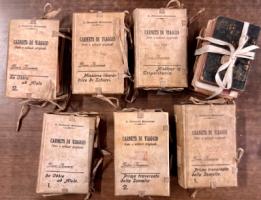The Faculty of Medieval and Modern Languages is pleased to announce the start of a new UKRI funded research grant, led by Professor Emma Bond (Italian). 'Reassessing (Hi)stories of Early Italian Colonialism: The Afterlives of Luigi Robecchi Bricchetti's African Collections' was awarded £1.27 million to undertake three years of activity, starting 1st July 2025. Emma will work alongside Dr Antonio Maria Morone (University of Pavia, Italy), and international partners in Egypt (Cairo) and Ethiopia (Addis Ababa; Harar) to use Bricchetti's museum collections to change understandings of how Italian colonialism was conceptualised and initiated in the Horn of Africa.
Born in Pavia, Italy, in 1855, Luigi Robecchi Bricchetti explored territories of colonial interest in Egypt, Libya and the Horn of Africa between 1885-1903. He donated most of the ethnographic, photographic, documentary and other materials he collected during his travels to his birth city. On fascist Italy's inaugural 'Colonial Day' (21 April 1926), this collection became the 'Colonial Section' of Pavia's city museum. Bricchetti died one month later. Since the Second World War, in a trend of colonial amnesia in Italy, Bricchetti's name has fallen into obscurity. His collections now lie in storage facilities and require conservation and comprehensive cataloguing from a critical and decolonial perspective in order to fully resignify in our contemporary age.
The grant will allow three postdoctoral researchers based in Oxford and Pavia (Dr Sean Wyer, Dr Federica Ferrero and Dr Chiara Pagano) to explore and answer three main intersecting questions:
1) How did Bricchetti's travels enhance geographical, linguistic and cultural knowledge of territories in order to facilitate their later occupation by Italy?
2) How did his activities help create a cultural imaginary of (future) colonies and generate broader Italian knowledge about Africa?
3) What was the role of other European agents, African intermediaries, and communities in his work?
The grant will engage people from various communities and countries implicated in Bricchetti's collecting in order to co-create new, more inclusive histories of African-Italian relations for the present and future. Working at the interface of public history, memory studies, and museology, we will transform historical consciousness of how and why Italy became a colonial power through a range of self-reflexive and imaginative outputs, including public exhibitions, work with schools and school teachers, a decolonial walking tour app and a sustainable digital repository.
